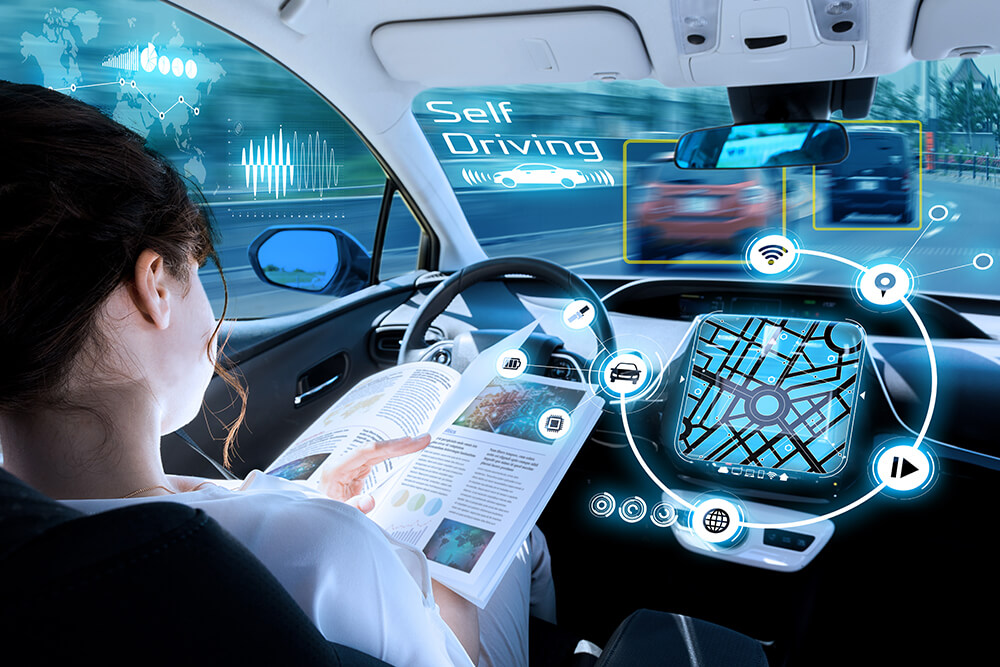5 Ways Self-Driving Cars Could Make Our World (And Our Lives) Better
2 July 2021
With more than 40 companies actively investing in autonomous vehicle technology, it’s fair to say that most traditional car manufacturers – plus the odd tech heavyweight, like Google parent company Alphabet – are busy chasing the self-driving car dream.

As a result, we’re likely to see the first truly autonomous, commercially viable driverless cars hit the market in the coming years. If that happens, autonomous vehicles have the potential to improve our world and make everyday life that little bit easier. Here are five ways I think society will benefit from autonomous cars.
1. Making our roads safer
While there have been some high-profile cases of autonomous vehicles being involved in tragic fatal accidents, data suggests that self-driving cars will ultimately make our roads safer. Statistics from the National Highway Traffic Safety Administration (NHTSA) show that driver error is by far the biggest cause of road traffic accidents, due to factors like miscalculations, errors of judgement, speeding, drink-driving, and phone use. In fact, an alarming 94 percent of serious crashes are down to human error. Fully autonomous vehicles would take human error out of the equation, thereby making our roads safer not just for drivers, but also passengers, cyclists, and pedestrians. For that reason, the NHTSA has championed the safety benefits of autonomous vehicles.
2. Easing parking woes
It’s also hoped that autonomous vehicles will improve parking in congested cities because driverless vehicles could simply drop passengers off and move on. This becomes increasingly realistic if the motorists of the future choose not to purchase their own self-driving vehicle, but instead make use of automated ride-sharing or taxi services. As an added bonus, with fewer people needing to find a parking space, land that is currently used for huge car parks could be repurposed for much-needed housing or attractive public spaces. With this in mind, the city of Chandler in Arizona has already changed its zoning laws to accommodate autonomous vehicles; developers will now be able to build properties with fewer parking spaces, so long as they provide suitable kerb-side passenger loading zones. In other words, the buildings of the future may no longer be flanked by huge, ugly car parks, and will instead favour dedicated areas for drop-offs and pick-ups.
3. Making the daily commute more bearable
When we reach the point where human intervention behind the wheel is no longer needed, autonomous vehicles will drastically improve the daily commute. Imagine, instead of sitting behind the wheel, you’ll be able to stretch out in the back, get ahead on some work, or simply relax and catch up on your latest Netflix obsession. When you think that Americans spend 19 full working days a year stuck in traffic on their commute, that’s an awful lot of time commuters will be able to claw back for themselves.
4. Reducing emissions (well, in theory)
In the future, with the majority of self-driving vehicles being electric or hybrids, and given the fact that autonomous vehicles drive more efficiently than humans, we could see a serious reduction in emissions. That’s the hope, anyway. One study by the University of California, Davis suggests that automated vehicles could reduce greenhouse gas emissions by as much as 80 percent by 2050 – but only if the vehicles are electric and shared. If we don’t transition towards more shared vehicles, then the worrying prediction is emissions could actually increase (by as much as 50 percent by 2050, according to the same study). This is because self-driving cars could make car ownership possible for people who cannot drive, potentially increasing the number of vehicles and miles driven. Therefore, this benefit is far from a foregone conclusion. As a society, we’ll need to rethink our attitude towards car ownership if we’re to reap the full environmental benefits of autonomous vehicles.
5. Cutting domestic air travel
Volvo’s 360c concept car, which was unveiled in 2018, provides a glimpse of a future in which self-driving cars are no longer just cars – they’re places to work, sleep, and relax. Almost a cross between a hotel room and the first-class cabin of a plane. Volvo’s vision is one of a luxurious, driverless future in which a car can pick you up and take you wherever you need to go, potentially eliminating the need for short-haul, domestic air travel. With Volvo’s concept, you would be able to order a car, pre-order food and drink, and then recline and relax in the back while the car transports you to your destination. You then arrive fresh-faced and relaxed, having endured none of the stress and exhaustion of plane travel. Particularly for journeys that could be made overnight, this vision could seriously disrupt the travel industry – and cut the carbon footprint associated with travel.
Related Articles
4 Smartphones Leading The AI Revolution
As enterprises increasingly rely on company-issued smartphones as primary computing devices, these mobile devices are becoming the frontline of workplace AI integration.[...]
The Rise Of AI-Enabled Virtual Pets: Why Millions Are Raising Digital Companions
Remember Tamagotchis? Those tiny digital pets that had millions of kids frantically pressing buttons to keep their virtual companions alive in the 1990s?[...]
The Dark Side Of AI: How Deepfakes And Disinformation Are Becoming A Billion-Dollar Business Risk
Every week, I talk to business leaders who believe they're prepared for AI disruption. But when I ask them about their defense strategy against AI-generated deepfakes and disinformation, I'm usually met with blank stares.[...]
Why You Should Be Polite To ChatGPT And Other AIs
In my latest conversation with ChatGPT, I caught myself saying "please" and "thank you." My wife, overhearing this, couldn't help but laugh at my politeness toward a machine.[...]
The 7 Revolutionary Cloud Computing Trends That Will Define Business Success In 2025
Picture this: A world where quantum computing is as accessible as checking your email, where AI automatically optimizes your entire cloud infrastructure, and where edge computing seamlessly melds with cloud services to deliver lightning-fast responses.[...]
AI And The Global Economy: A Double-Edged Sword That Could Trigger Market Meltdowns
The stock market's current AI euphoria, driven by companies like NVIDIA developing powerful processors for machine learning, might mask a more troubling reality.[...]
Sign up to Stay in Touch!
Bernard Marr is a world-renowned futurist, influencer and thought leader in the fields of business and technology, with a passion for using technology for the good of humanity.
He is a best-selling author of over 20 books, writes a regular column for Forbes and advises and coaches many of the world’s best-known organisations.
He has a combined following of 4 million people across his social media channels and newsletters and was ranked by LinkedIn as one of the top 5 business influencers in the world.
Bernard’s latest book is ‘Generative AI in Practice’.










Social Media